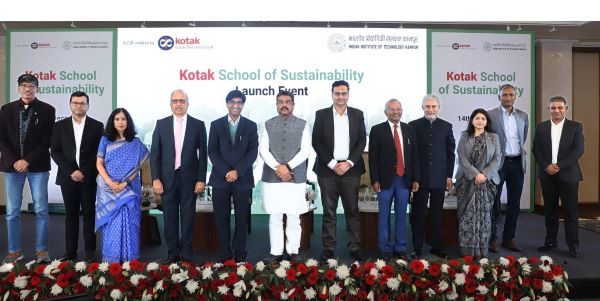The Indian Institute of Technology Kanpur (IITK) and the Kotak Mahindra Bank Limited (“KMBL”/ “Kotak”) on Dec 15 announced the launch of Kotak School of Sustainability – India’s first fully integrated school of sustainability at IIT Kanpur. KMBL is funding IITK through its CSR program to establish Kotak School of Sustainability with a vision to promote pedigree education, research, and outreach with a commitment of Rs 200 Cr.
This School is poised to offer thought leadership solutions towards sustainability actions and prepare future generations to lead the cause of sustainable development. The School will bring together departments and centres of excellence at IITK with an aim to provide an enabling environment for collaborative research across multiple facets of sustainability. Kotak School of Sustainability will have dedicated centres of excellence covering different aspects of sustainability such as clean energy, environment, ecology, circular economy, climate finance, sustainable societies and policy.
The launch event was graced by Dharmendra Pradhan, Union Minister of Education and Skill Development and Entrepreneurship; Dr. Abhay Karandikar, Secretary, Department of Science & Technology, and Nagendra Nath Sinha, Secretary, Ministry of Steel, as guests of honour.
Prof. S. Ganesh, Director, IIT Kanpur; Prakash Apte, Chairman Kotak Mahindra Bank, Shanti Ekambaram, Whole-time Director, Kotak Mahindra Bank, C S Rajan, Independent Director, Kotak Mahindra Bank, Himanshu Nivsarkar, Senior EVP and Head CSR, Kotak Mahindra Bank and Kapil Kaul, Chief Executive Officer, IIT Kanpur Development Foundation who were present at the event spoke on various aspects of the new school.
Prof. Ashish Garg, Professor-in-Charge of the School, referring to the IIT-Kanpur’s legacy in computer sciences said that the premier institute is looking at providing leadership and creating a legacy as sustainability talks and solutions take a centre-stage. He added, “The Kotak School of Sustainability aims to excel in sustainability education, research and innovation, technology development, entrepreneurship, and outreach. The key to the development of holistic end-to-end technology solutions for sustainable development will be school’s emphasis on synergistic integration of different aspects of sustainability for greater educational, scientific, technological, environmental and social impact.”
The Kotak School of Sustainability, which will begin by offer minors and other research projects to both UG and PG levels will be led by tenured professors and leading industry experts from across the globe. The School is placed to run both undergraduate and postgraduate academic and skill-building programs in different themes of sustainability. The School will be housed in a green building in IITK’s main campus that will be platinum-rated with net zero practices on energy, water, and waste.
Global warming poses a serious threat to our existence, manifesting in untimely natural calamities, pollution, and biodiversity loss. Research indicates irreversible ‘Tipping Points’ with rapid, harmful climatic changes. Realising this is an imminent existential crisis and that anthropogenic activities need to be environmentally sustainable; world leaders have been discussing in COP (Conference of Parties) meetings to come up with policies and actions that can lead to a sustainable future. The United Nations (UN’s) seventeen sustainable development goals address this challenge, crucial in densely populated countries like India. Urgent climate actions are needed to mitigate, adapt, and build resilience.
Despite the challenge, collaboration among policymakers, academia, businesses, and society offers opportunities for the mitigation, adaptation and resilience to climate change. In addressing the climate-driven sustainability challenge, educational institutions play a vital role. The UN emphasizes education’s role in promoting climate action, empowering people to understand and address climate impacts. Sustainability education and research require academic institutions to blend environmental science and clean technology-based approaches with social, economic and ecological aspects of sustainability. Institutions, through Education, Empowerment, and Engagement (3E), can lead climate action, empowering communities and conserving the natural ecosystem.
Dharmendra Pradhan speaking on the ocassion said “The National Research Foundation was set up to boost research and innovation through funding from industry and government. I thank Kotak Mahindra Bank for taking the right step and accepting the responsibility by contributing towards setting up the School of Sustainability. The Kotak School of Sustainability will give global leadership in the field in line with the history of IIT Kanpur and its alumni who are leaders in organizations across the world. The school will not only be about technology and economics, but will cover the A to Z of sustainability. This will be instrumental in helping India meet the ambitious target of net zero by 2070, as announced by our Hon’ble Prime Minister, Shri Narendra Modi ji.”
Prof. S. Ganesh, Director, IIT Kanpur, said, “Sustainability has emerged as one of the foremost global challenges of our times which requires various stakeholders to work together and the role of educational institutes like ours is extremely crucial in this mission. Adding to many of IIT Kanpur’s path-breaking initiatives and with the generous CSR funding support from Kotak Mahindra Bank, Institute is establishing ‘Kotak School of Sustainability’ with the overall vision of providing thought leadership, developing concrete solutions toward sustainability actions, and preparing future generations to lead the cause of sustainable development.”
Ms. Shanti Ekambaram, Whole time Director, Kotak Mahindra Bank said, “As India continues on its growth path with aspirations to reach high middle-income status, our ability to exist and develop without depleting all of the natural resources will be a challenge that needs to be addressed. The Kotak School of Sustainability marks our commitment to contribute to growing India’s skilled workforce towards achieving the goal of long term sustainable development including its net-zero target by 2070. The Bank’s CSR Project being implemented in association with IIT Kanpur will focus on enhancing home-grown capabilities to address sustainable development.”













